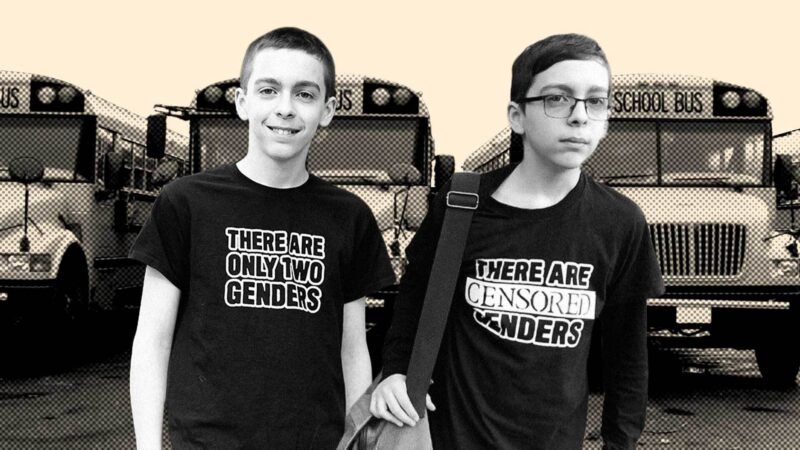Can Schools Ban This 'There Are Only Two Genders' Shirt? Supreme Court Declines To Hear Free Speech Case
A Massachusetts 7th grader was sent home for wearing the shirt, though the school allows students to challenge the idea it conveyed.

The Supreme Court on Tuesday declined to hear a case from a minor whose Massachusetts middle school refused to let him wear a shirt that said "THERE ARE ONLY TWO GENDERS," reinvigorating the debate about how much latitude public schools have to restrict students' speech in the classroom.
The plaintiff—a 12-year-old 7th grader at the time of the incident, identified as L.M. in the lawsuit—was booted from class in 2023 and sent home from Nichols Middle School in Middleborough, Massachusetts, after he refused to change clothes. When he came back wearing a shirt that said "THERE ARE CENSORED GENDERS"—the same shirt but with "CENSORED" written across a piece of tape—he was sent to meet with the principal, who said he could keep the shirt in his backpack or in the assistant principal's office. He obliged and returned to class.
When L.M. first sued, alleging a First Amendment violation, Judge Indira Talwani of the United States District Court for the District of Massachusetts ruled that the school likely acted within its rights and thus denied his request for a preliminary injunction. "School administrators were well within their discretion to conclude that the statement 'THERE ARE ONLY TWO GENDERS' may communicate that only two gender identities—male and female—are valid, and any others are invalid or nonexistent," she wrote, "and to conclude that students who identify differently, whether they do so openly or not, have a right to attend school without being confronted by messages attacking their identities."
At the core of the case, and those like it, is Tinker v. Des Moines Independent Community School District, the 1969 Supreme Court precedent in which the justices ruled 7–2 it was unconstitutional when an Iowa school suspended students who wore black armbands in protest of the Vietnam War. "It can hardly be argued," wrote Justice Abe Fortas, "that either students or teachers shed their constitutional rights to freedom of speech or expression at the schoolhouse gate."
Tinker, however, came with a caveat. Schools can seek to stymie expression that causes, or could potentially cause, a "substantial disruption," a test that courts have struggled with for decades.
When the U.S. Court of Appeals for the 1st Circuit heard L.M.'s case next, this tension was at the center of the opinion. The shirt here was analogous to the Tinker armbands in that its message was expressed "passively, silently, and without mentioning any specific students," the judges wrote. But it diverged, the court said, in that it "assertedly demean[ed] characteristics of personal identity, such as race, sex, religion, or sexual orientation." (Jason Carroll, the assistant principal, said there was concern that L.M.'s shirt "would be disruptive and would cause students in the LGBTQ+ community to feel unsafe.")
The court responded with a two-prong test it said was in line with Tinker. A school may censor passive expression if it "is reasonably interpreted to demean one of those characteristics of personal identity, given the common understanding that such characteristics are unalterable or otherwise deeply rooted" and "the demeaning message is reasonably forecasted to poison the educational atmosphere due to its serious negative psychological impact on students."
It's ironic that the court would rely on the notion of a "common understanding" to buttress its decision when considering that a hefty majority—65 percent as of 2023—of American adults believe there are only two gender identities. It is not a particularly contentious point, despite it often being portrayed that way. That such a basic statement could be seen as too offensive—regardless of whether someone identifies as gender-nonconforming—is not an encouraging stance for any institution to take, much less one devoted to education.
That is especially relevant here, however, as Nichols Middle School allowed students to challenge the idea that there are only two genders. You don't need to agree with the student's shirt to support his right to contribute to that conversation. The First Amendment protects unpopular speech, after all—something school administrators should understand, given that their position is, in reality, the unpopular one in society today.
It's for that reason that, in dissent, Justice Samuel Alito said the school had violated the First Amendment's shield against viewpoint discrimination. "If a school sees fit to instruct students of a certain age on a social issue like LGBTQ+ rights or gender identity, then the school must tolerate dissenting student speech on those issues," he wrote. "If anything, viewpoint discrimination in the lower grades is more objectionable because young children are more impressionable and thus more susceptible to indoctrination."


Show Comments (46)